Allele
Definition:
An Allele (from the Greek állos, "other”) is one or more forms of the same gene at the same place on the chromosome. A gene is a region of DNA containing a specific nucleotide sequence. A gene can have two identical alleles or two different alleles. The smallest allele is a change in a single nucleotide (single nucleotide polymorphism or SNP) while other alleles can be thousands of base-pairs long. Allelic variation is a key concept underpinning pharmacogenetics and pharmacogenomics.
Relevance:
While many alleles have no observable effects some alleles can produce phenotypic effects; for example, Gregor Mendel’s seminal work on genetics demonstrated that white or purple flowers in pea plants are due to the effects of a single gene with two alleles. The phenotypic impact of allelic variation is core to the impact of genetics on on drug disposition and response. The characterization of allelic variation – from SNPs to more complex variation – is increasingly being used to guide drug therapy and predict drug response.
An example is illustrated below. A gene codes for flower colour with two alleles, a blue allele (A) that is dominant and a white allele (a) that is recessive. When the dominant allele (A) is present, the flower is blue whether there is one copy (heterozyote) or two copies (homozygote). The recessive allele (a) is only expressed in the homozygote state (when both recessive alleles are present). To extrapolate this to drug therapy, if a gene codes for a drug metabolizing enzyme and there are two forms – normal metabolism or poor metabolism, with the poor metabolism phenotype being recessive – the poor metabolism phenotype is only seen when both alleles are present.

Of additional relevance, allelic variation is not uniformly distributed worldwide; as the figure below demonstrates, alleles associated with drug response have significant variability between populations in Africa (AFR), Admixed Americas (AMR), East Asia (EAS), Europe (EUR) and South Asian (SAS).

Examples of Alleles that Influence Drug Therapy – the Case of CYP2D6:
CYP2D6 is an important isozyme for Phase I drug metabolism. This is a polymorphic enzyme that exists with ultrarapid, extensive and poor metabolizer phenotypes. There are determined by allelic variation and exist in different frequency in different populations.
|
Gene
|
Allele
|
Clinical Consequences
|
|
CYP2D6
|
CYP2D6*4
|
This is a loss-of-function allele that will produce a poor metabolizer phenotype; this is more common in northern European populations than in southern Europe
|
|
CYP2D6
|
CYP2D6*1×N
|
This is a gene duplication that will produce an ultrarapid metabolizer phenotype; this is more common in southern European populations than in northern Europe
|
Teaching tips:
Considerations around how alleles used to teach about:
-
Understanding how study of allelic variations can be applied to improve clinical care
-
Appreciating how the fate of a drug may be predicted by understanding the genetics regulating the drug’s disposition and response
Suggested articles on this topic:
- Ahsan T et al. Heterogeneity in the distribution of 159 drug-response related SNPs in world populations and their genetic relatedness. PLOS ONE 2020; 15(1): e0228000. https://doi.org/10.1371/journal.pone.0228000
- This manuscript reviews the scope of allelic variations in 159 SNPs in a range of ethnic groups worldwide
- Kalman LV et al. Pharmacogenetic allele nomenclature: International workgroup recommendations for test result reporting. Clin PharmacolTher2016; 99: 172-85.
- This manuscript presents recommendations for allele nomenclature to enhance standardization of pharmacogenetic reporting and implementation of clinically impactful pharmacogenomic testing
Linked terms: Clinical Pharmacology, Pharmacogenetics, Pharmacogenomics, Haplotype
Return to Glossary
